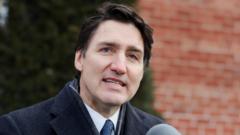Prime Minister Justin Trudeau has responded emphatically to Donald Trump’s recent provocations regarding Canada's potential inclusion as the 51st U.S. state. At a press conference from his Florida estate, Trump suggested that eliminating the border between the U.S. and Canada could enhance national security. However, Trudeau countered Trump’s assertions by asserting that Canada would not consider such a move.
In the wake of Trump's statements, which he reiterated during his press conference, concerns have risen over the proposed imposition of substantial tariffs on Canadian goods if Canada fails to bolster security at the border. These tariffs could significantly impact Canada's economy, with daily trade between the two countries valued at approximately C$3.6 billion ($2.5 billion) as of 2023.
The political climate in Canada remains tense, particularly as Trudeau announced his resignation on Monday, though he will continue as prime minister until a new leader is chosen by late March. The Canadian parliament has been prorogued until that time to facilitate the leadership race.
Economists warn that tariffs could devastate Canada’s economy if enacted by Trump after his inauguration on January 20. In response, Trudeau’s government is contemplating counter-tariffs, emphasizing the mutual benefits both countries enjoy from their trading relationship.
In his Mar-a-Lago address, Trump also expressed concerns about military spending in Canada, noting that the nation relies heavily on U.S. military protection and has historically underfunded its defense budget. Canada's defense spending is currently at C$27 billion ($19.8 billion), with intentions to increase it to nearly C$50 billion by 2030.
British Columbia Premier David Eby has announced that several provincial leaders will soon head to Washington, D.C., to advocate against potential tariffs, with Ontario's Premier Doug Ford urging Trudeau to collaborate with provincial leaders during the final weeks of his tenure. Ford noted, "The premiers are leading the country right now," given their significant economic ties with the U.S.
Ford also made light of Trump’s comments about Canadian statehood by suggesting that Canada could offer to purchase Alaska and Minnesota instead. As the situation unfolds, the focus remains on how Canada will navigate its trade relationship with the U.S. under Trump’s administration.
In the wake of Trump's statements, which he reiterated during his press conference, concerns have risen over the proposed imposition of substantial tariffs on Canadian goods if Canada fails to bolster security at the border. These tariffs could significantly impact Canada's economy, with daily trade between the two countries valued at approximately C$3.6 billion ($2.5 billion) as of 2023.
The political climate in Canada remains tense, particularly as Trudeau announced his resignation on Monday, though he will continue as prime minister until a new leader is chosen by late March. The Canadian parliament has been prorogued until that time to facilitate the leadership race.
Economists warn that tariffs could devastate Canada’s economy if enacted by Trump after his inauguration on January 20. In response, Trudeau’s government is contemplating counter-tariffs, emphasizing the mutual benefits both countries enjoy from their trading relationship.
In his Mar-a-Lago address, Trump also expressed concerns about military spending in Canada, noting that the nation relies heavily on U.S. military protection and has historically underfunded its defense budget. Canada's defense spending is currently at C$27 billion ($19.8 billion), with intentions to increase it to nearly C$50 billion by 2030.
British Columbia Premier David Eby has announced that several provincial leaders will soon head to Washington, D.C., to advocate against potential tariffs, with Ontario's Premier Doug Ford urging Trudeau to collaborate with provincial leaders during the final weeks of his tenure. Ford noted, "The premiers are leading the country right now," given their significant economic ties with the U.S.
Ford also made light of Trump’s comments about Canadian statehood by suggesting that Canada could offer to purchase Alaska and Minnesota instead. As the situation unfolds, the focus remains on how Canada will navigate its trade relationship with the U.S. under Trump’s administration.




















